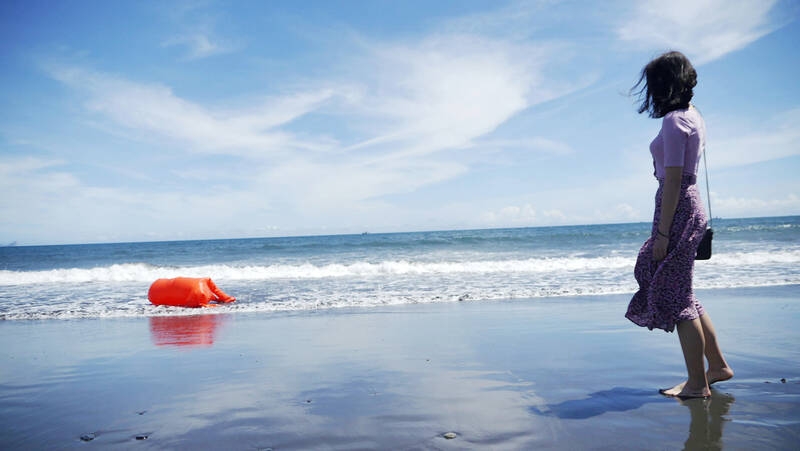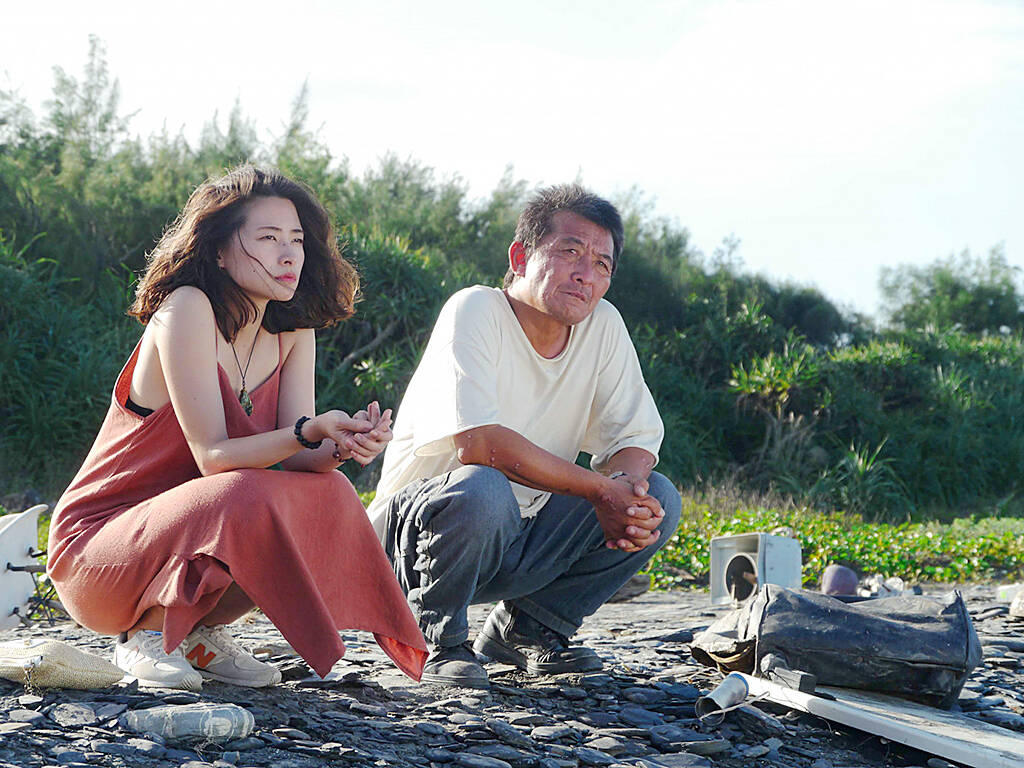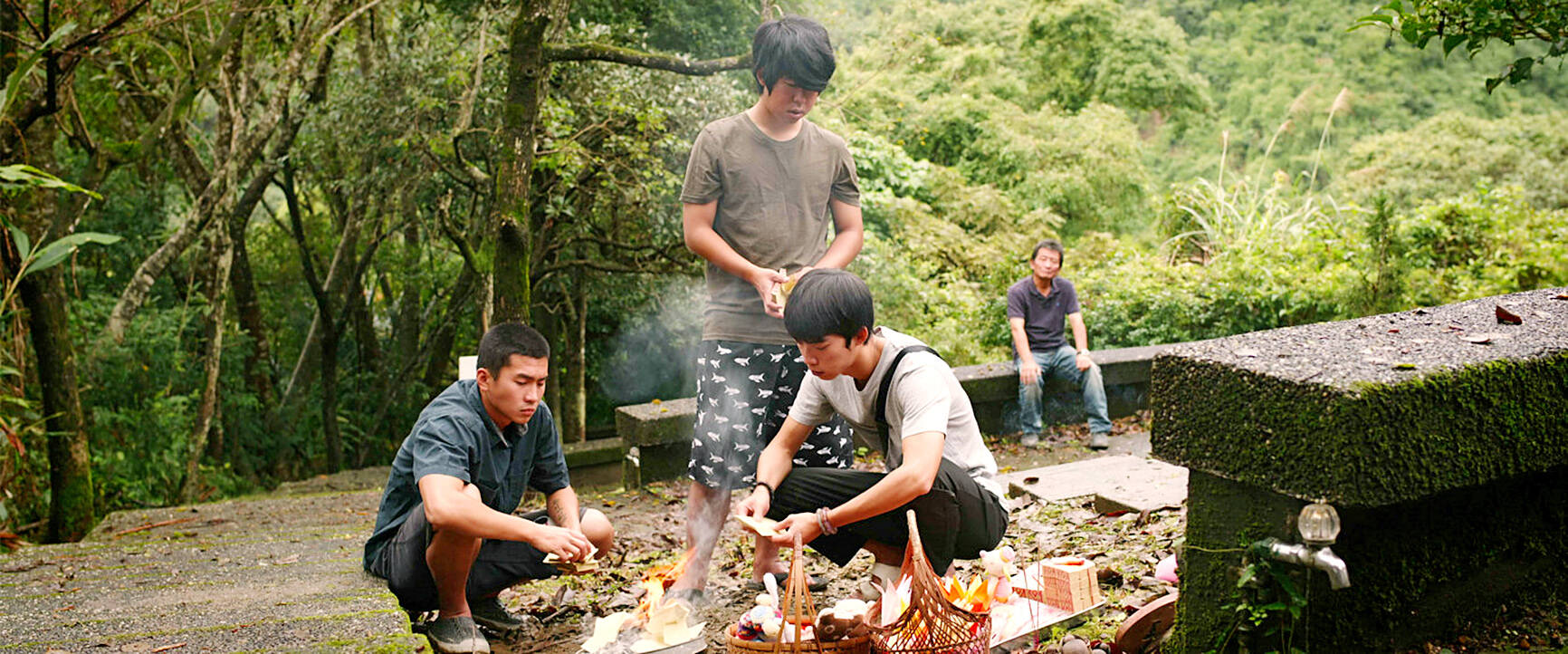From an outsider’s perspective, things are quite grim for the Chen family. Set in perpetually-rainy rural Yilan County near the beach, this subdued drama revolves around youngest son A-liang (Tung Liang-yu, 董亮宇), who performs odd jobs and devotes himself to taking care of his mentally disabled elder brother A-ting (Chung Shang-ting, 鍾尚庭). He’s also a talented artist whose bedroom walls are plastered with his drawings.
Meanwhile, eldest son A-wei (Wu Wei-han, 吳威翰) engages in questionable activities and rarely comes home, and the stern, silent yet sensitive father A-ming (Chen Ming, 陳銘) tries his best to keep the family afloat while his wife is in the hospital.
The natural beauty of their surroundings is mostly littered with trash, and A-liang and A-ting spend their days playing baseball among the debris, catching fish in the dirty pond and scavenging junk washed up on the beach.

Photo courtesy of Golden Horse Film Festival
But somehow, their situation does not come off as pitiful nor sad. They may not seem to have much to look forward to, but they’re not exactly struggling either. Like his previous film Synapses (那個我最親愛的陌生人, reviewed on Nov. 28, 2019), which deals with dementia and memory loss, director Chang Tso-chi (張作驥) presents the story through extended vignettes of the family’s daily interactions. Flotsam and Jetsam (夏日天空的那匹紅馬) goes more into detail with their mundane activities and has even less of a clear plot, but what’s different is that it doesn’t dwell on hopelessness and despair. It’s even heart-warming at times.
Nothing dramatic happens to the family and the characters don’t express themselves very well, if at all, but it’s clear that they care deeply about each other. The father and two younger sons eat dinner together every day, and while the conversation mostly consists of things like “eat more vegetables, don’t just eat meat” and “don’t drink too much alcohol,” their bonds are evident. Even the wayward eldest son tries to provide for them and shows up when it’s time to visit the bedridden mother.
One of the more poignant scenes is when A-zhen (Fox Lee, 李亞臻), a young woman who barges into their lives, attends A-ting’s birthday party and expresses her envy for what the family has. And the brief conversation with A-liang that ensues is one of the very few moments where he talks about how he really feels. A-ting gets drunk that night and poops his pants, and while A-liang scolds him and grumbles, he still cleans up after his brother and they head out together again the following day, with A-ting clutching onto the back of A-liang’s shirt.

Photo courtesy of Golden Horse Film Festival
A-zhen’s side-story of longing and searching provides some drama and distraction from the monotony of the all-male household, and her animated, gangster-ish ex-boyfriend (Huang Huai-te, 黃懷德), who raps at a local night market, provides absurdist comedic relief. Chang could have expanded more on A-zhen’s background, as there are several scenes that are confusing and unclear. It would also give a bit more color (literally, as she wears bright clothes compared to the others) to the story.
While many Taiwanese films of this genre focus on family conflict and dysfunction, there’s little bitterness or complaints (although a lot of nagging) in Flotsam and Jetsam. The central motif in the film, as the Chinese title indicates, is a giant inflatable red horse, and it seems to represent the bit of hope that the characters manage to hold on to, no matter how hard things get.
It’s not the easiest film to watch as one constantly wonders if the plot is going anywhere, and many of the subtle details only sink in afterward. But it’s beautifully shot (even the garbage-filled scenes are somehow poetic) and edited, with a fitting emotional soundtrack that amplifies the mood.

Photo courtesy of Golden Horse Film Festival

April 14 to April 20 In March 1947, Sising Katadrepan urged the government to drop the “high mountain people” (高山族) designation for Indigenous Taiwanese and refer to them as “Taiwan people” (台灣族). He considered the term derogatory, arguing that it made them sound like animals. The Taiwan Provincial Government agreed to stop using the term, stating that Indigenous Taiwanese suffered all sorts of discrimination and oppression under the Japanese and were forced to live in the mountains as outsiders to society. Now, under the new regime, they would be seen as equals, thus they should be henceforth

Last week, the the National Immigration Agency (NIA) told the legislature that more than 10,000 naturalized Taiwanese citizens from the People’s Republic of China (PRC) risked having their citizenship revoked if they failed to provide proof that they had renounced their Chinese household registration within the next three months. Renunciation is required under the Act Governing Relations Between the People of the Taiwan Area and the Mainland Area (臺灣地區與大陸地區人民關係條例), as amended in 2004, though it was only a legal requirement after 2000. Prior to that, it had been only an administrative requirement since the Nationality Act (國籍法) was established in

Three big changes have transformed the landscape of Taiwan’s local patronage factions: Increasing Democratic Progressive Party (DPP) involvement, rising new factions and the Chinese Nationalist Party’s (KMT) significantly weakened control. GREEN FACTIONS It is said that “south of the Zhuoshui River (濁水溪), there is no blue-green divide,” meaning that from Yunlin County south there is no difference between KMT and DPP politicians. This is not always true, but there is more than a grain of truth to it. Traditionally, DPP factions are viewed as national entities, with their primary function to secure plum positions in the party and government. This is not unusual

The other day, a friend decided to playfully name our individual roles within the group: planner, emotional support, and so on. I was the fault-finder — or, as she put it, “the grumpy teenager” — who points out problems, but doesn’t suggest alternatives. She was only kidding around, but she struck at an insecurity I have: that I’m unacceptably, intolerably negative. My first instinct is to stress-test ideas for potential flaws. This critical tendency serves me well professionally, and feels true to who I am. If I don’t enjoy a film, for example, I don’t swallow my opinion. But I sometimes worry